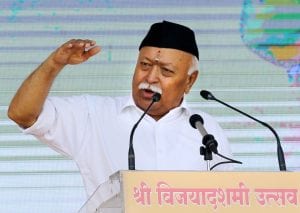
CAA, NRC won't hurt Muslims, says RSS chief Bhagwat

The Citizenship (Amendment) Act and the National Register of Citizens (NRC) would not harm India’s Muslim citizens and that these measures would fast-track citizenship process for persecuted non-Muslims from Bangladesh, Afghanistan, and Pakistan, said Rashtriya Swyamsevak Sangh (RSS) chief Mohan Bhagwat.
Speaking at the launch of Gauhati University professor Nani Gopal Mahanta’s book on NRC and CAA, Bhagwat urged the voters “to check” those who were trying to politicise the issues on communal lines.

The CAA, passed in 2019, triggered nationwide protests, especially by Muslim youths who feared disenfranchisement and termed the law as unacceptable. The protests also led to large-scale communal violence in north-east Delhi in which over 50 people were killed and properties worth crores of rupees were damaged. The opponents of the law insist it is discriminatory and unconstitutional as it links faith to citizenship in a secular country.
Also read: CAA riots case: Delhi police ‘miserably failed’ in statutory duties, says court
The CAA triggered fears of a fresh influx of immigrants into Assam from Bangladesh and sparked protests in the state. Its opponents in Assam say the legislation violates the 1985 Assam Accord signed following an agitation for the detection and deportation of undocumented immigrants irrespective of their faith. The accord set March 24, 1971, as the cut-off date for the detection. A process in line with the accord was carried out in Assam and led to the exclusion of around two million people from the NRC.
Bhagwat said CAA and NRC are not against any Indian citizen. “The (1950) Nehru-Liaquat Pact clearly stated that each country would protect its minorities. India has been following it, Pakistan failed to do so,” said Bhagwat.
He said since 1930, there have been attempts to increase the Muslim population in a “planned manner” to “exercise dominance and slowly turn this nation into Pakistan”.
“This was true for Punjab, Sindh, Assam, and Bengal. The plan worked to an extent as India got partitioned and Pakistan was created. But it did not happen entirely as planned and Assam did not go to Pakistan, though part of Bengal and Punjab got divided.” Bhagwat said this forced some persecuted people in Pakistan to come to India seeking refuge. He said others came with the idea of increasing their population.
Also read: SC allows bail to 3 JNU student-activists; to examine High Court verdict
“Respect for other religions, cultures, and languages are part of India’s culture. We do not have to learn about secularism, socialism, democracy from anyone else in the world. Our Constitution clearly defines rights and duties. The problem arises when people want all rights and do not want to follow the duties.”
Assam Chief Minister Himanta Biswa Sarma said the protests against CAA in other parts of the country were completely different from the ones in Assam. “While the former sought inclusion of Muslims on the list of communities mentioned in the legislation (CAA), the protests in Assam were against the inclusion of all communities and was against the legislation itself,” he said.
“The viewpoint of those opposing CAA from the national perspective is very communal. They want the inclusion of Muslims in CAA. But in Assam, it is different as those who are protesting do not want either Hindu migrants or Muslims who migrated to India to become citizens.”
Sarma said they have a duty towards the persecuted people. “That is why I am a supporter of CAA and will remain one. But at the same time, we need to take measures to protect our Assamese identity and culture,” he said.


